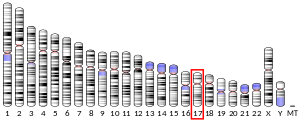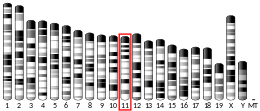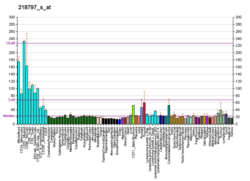Sirtuin 7
NAD-dependent deacetylase sirtuin 7 is an enzyme that in humans is encoded by the SIRT7 gene.[5][6][7]
Function
This gene encodes a member of the sirtuin family of proteins, homologs to the yeast Sir2 protein. Members of the sirtuin family are characterized by a sirtuin core domain and grouped into four classes. The functions of human sirtuins have not yet been determined; however, yeast sirtuin proteins are known to regulate epigenetic gene silencing and suppress recombination of rDNA. Studies suggest that the human sirtuins may function as intracellular regulatory proteins with mono-ADP-ribosyltransferase activity. The protein encoded by this gene is included in class IV of the sirtuin family.[7]
In humans cells, SIRT7 has only been shown to interact with two other molecules: RNA polymerase I (RNA Pol I) and upstream binding factor (UBF).[6] SIRT7 is localized to the nucleolus and interacts with RNA Pol I. Chromatin immunoprecipitation studies demonstrate that SIRT7 localizes to rDNA, and coimmunoprecipitation shows that SIRT7 binds RNA Pol I. In addition SIRT7 interacts with UBF, a major component of the RNA Pol I initiation complex.[8] It is not known whether or not SIRT7 is modifying RNA Pol I and/or UBF, and if so, what those modifications are.
SIRT7 is expressed more in metabolically active tissues, such as liver and spleen, and less in non-proliferating tissues, such as heart and brain.[6] Furthermore, it has been shown that SIRT7 is necessary for rDNA transcription. Knock down of SIRT7 in HEK293 cells resulted in decreased rRNA levels. This same study found that this SIRT3 knockdown decreased the amount of RNA Pol I associated with rDNA, suggesting that SIRT7 may be required for rDNA transcription. Knock down SIRT7 led to reduced RNA Pol I levels, but RNA Pol I mRNA levels did not change. This suggests that SIRT7 plays a crucial role in connecting the function of chromatin remodeling complexes to RNA Pol I machinery during transcription.[9]
SIRT7 may help attenuate DNA damage and thereby promoting cellular survival under conditions of genomic stress.[10]
DNA repair
Depletion of SIRT7 results in impaired repair of DNA double-strand breaks (DSBs) by the process of non-homologous end joining (NHDJ).[11] DSBs are one of the most significant types of DNA damage leading to genome instability. SIRT7 is recruited to DSBs where it specifically deacylates histone H3 at lysine 18. This affects the focal accumulation of the DNA damage response factor 53BP1, a protein that promotes NHEJ by protecting DNA from end resection.[11][12]
Accelerated aging
Sirt7 mutant mice show phenotypic and molecular features of accelerated aging.[11] These features include premature curvature of the spine, reduced weight and fat content, compromised hematopoietic stem cell function and leukopenia, and multiple organ dysfunction.[11][12]
Clinical relevance
This gene has been found to be involved in maintenance of oncogenic transformation.[13]
References
- GRCh38: Ensembl release 89: ENSG00000187531 - Ensembl, May 2017
- GRCm38: Ensembl release 89: ENSMUSG00000025138 - Ensembl, May 2017
- "Human PubMed Reference:". National Center for Biotechnology Information, U.S. National Library of Medicine.
- "Mouse PubMed Reference:". National Center for Biotechnology Information, U.S. National Library of Medicine.
- Frye RA (Jul 2000). "Phylogenetic classification of prokaryotic and eukaryotic Sir2-like proteins". Biochemical and Biophysical Research Communications. 273 (2): 793–98. doi:10.1006/bbrc.2000.3000. PMID 10873683.
- Ford E, Voit R, Liszt G, Magin C, Grummt I, Guarente L (May 2006). "Mammalian Sir2 homolog SIRT7 is an activator of RNA polymerase I transcription". Genes & Development. 20 (9): 1075–80. doi:10.1101/gad.1399706. PMC 1472467. PMID 16618798.
- "Entrez Gene: SIRT7 sirtuin (silent mating type information regulation 2 homolog) 7 (S. cerevisiae)".
- Grob A, Roussel P, Wright JE, McStay B, Hernandez-Verdun D, Sirri V (Feb 2009). "Involvement of SIRT7 in resumption of rDNA transcription at the exit from mitosis". Journal of Cell Science. 122 (Pt 4): 489–98. doi:10.1242/jcs.042382. PMC 2714433. PMID 19174463.
- Tsai YC, Greco TM, Boonmee A, Miteva Y, Cristea IM (Feb 2012). "Functional proteomics establishes the interaction of SIRT7 with chromatin remodeling complexes and expands its role in regulation of RNA polymerase I transcription". Molecular & Cellular Proteomics. 11 (2): M111.015156. doi:10.1074/mcp.M111.015156. PMC 3277772. PMID 22147730.
- Mohrin M, Shin J, Liu Y, Brown K, Luo H, Xi Y, Haynes CM, Chen D (Mar 2015). "Stem cell aging. A mitochondrial UPR-mediated metabolic checkpoint regulates hematopoietic stem cell aging". Science. 347 (6228): 1374–77. Bibcode:2015Sci...347.1374M. doi:10.1126/science.aaa2361. PMC 4447312. PMID 25792330.
- Vazquez BN, Thackray JK, Simonet NG, Kane-Goldsmith N, Martinez-Redondo P, Nguyen T, Bunting S, Vaquero A, Tischfield JA, Serrano L (2016). "SIRT7 promotes genome integrity and modulates non-homologous end joining DNA repair". EMBO J. 35 (14): 1488–503. doi:10.15252/embj.201593499. PMC 4884211. PMID 27225932.
- Vazquez BN, Thackray JK, Serrano L (2017). "Sirtuins and DNA damage repair: SIRT7 comes to play". Nucleus. 8 (2): 107–15. doi:10.1080/19491034.2016.1264552. PMC 5403131. PMID 28406750.
- Barber MF, Michishita-Kioi E, Xi Y, Tasselli L, Kioi M, Moqtaderi Z, Tennen RI, Paredes S, Young NL, Chen K, Struhl K, Garcia BA, Gozani O, Li W, Chua KF (Jul 2012). "SIRT7 links H3K18 deacetylation to maintenance of oncogenic transformation" (PDF). Nature. 487 (7405): 114–18. Bibcode:2012Natur.487..114B. doi:10.1038/nature11043. PMC 3412143. PMID 22722849.
10.Crystal structure of the N-terminal domain of human SIRT7 reveals a three-helicaldomain architecture Anu Priyanka,1 Vipul Solanki,1 Raman Parkesh,2 and Krishan Gopal Thakur
Further reading
- de Nigris F, Cerutti J, Morelli C, Califano D, Chiariotti L, Viglietto G, Santelli G, Fusco A (Mar 2002). "Isolation of a SIR-like gene, SIR-T8, that is overexpressed in thyroid carcinoma cell lines and tissues". British Journal of Cancer. 86 (6): 917–23. doi:10.1038/sj.bjc.6600156. PMC 2364158. PMID 11953824.
- De Nigris F, Cerutti J, Morelli C, Califano D, Chiariotti L, Viglietto G, Santelli G, Fusco A (Dec 2002). "Isolation of a SIR-like gene, SIR-T8, that is overexpressed in thyroid carcinoma cell lines and tissues". British Journal of Cancer. 87 (12): 1479. doi:10.1038/sj.bjc.6600636. PMC 2376288. PMID 12454780.
- Voelter-Mahlknecht S, Letzel S, Mahlknecht U (Apr 2006). "Fluorescence in situ hybridization and chromosomal organization of the human Sirtuin 7 gene". International Journal of Oncology. 28 (4): 899–908. doi:10.3892/ijo.28.2.447. PMID 16525639.
- Ashraf N, Zino S, Macintyre A, Kingsmore D, Payne AP, George WD, Shiels PG (Oct 2006). "Altered sirtuin expression is associated with node-positive breast cancer". British Journal of Cancer. 95 (8): 1056–61. doi:10.1038/sj.bjc.6603384. PMC 2360714. PMID 17003781.




